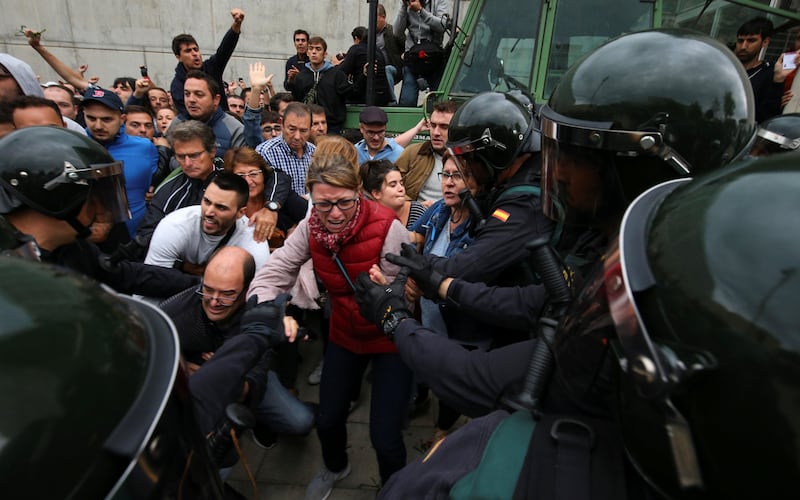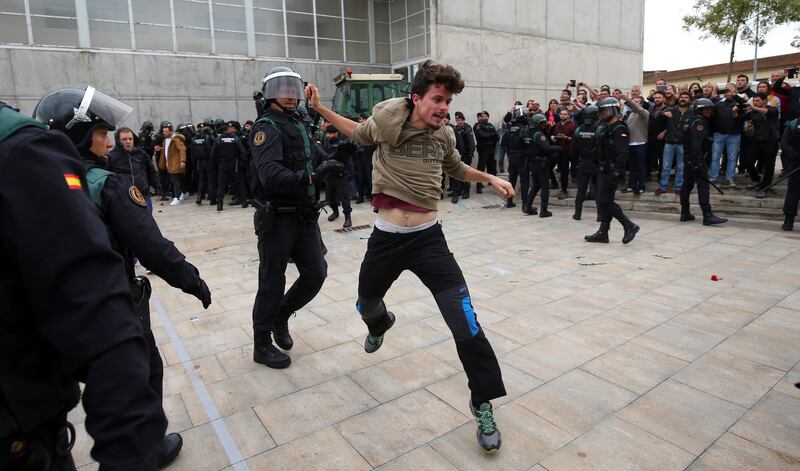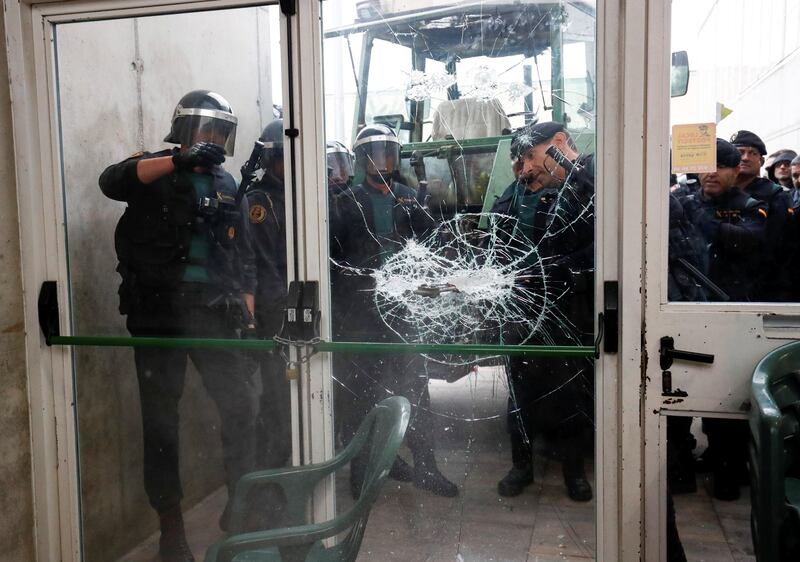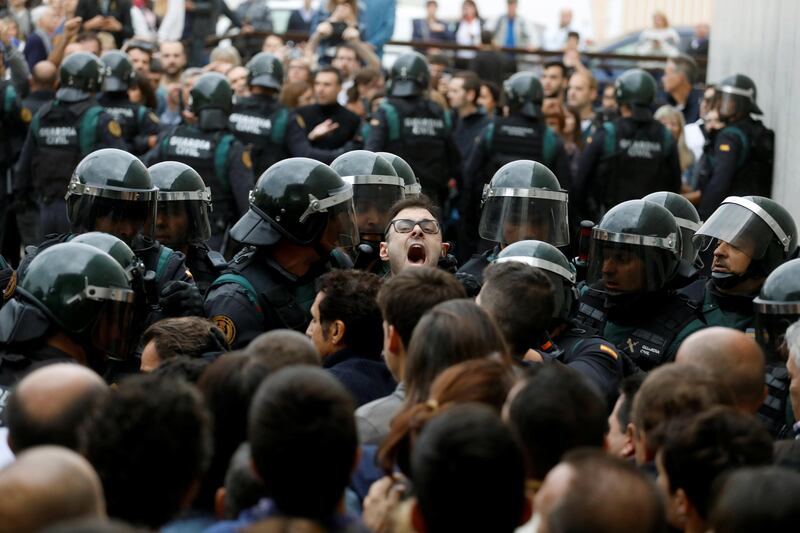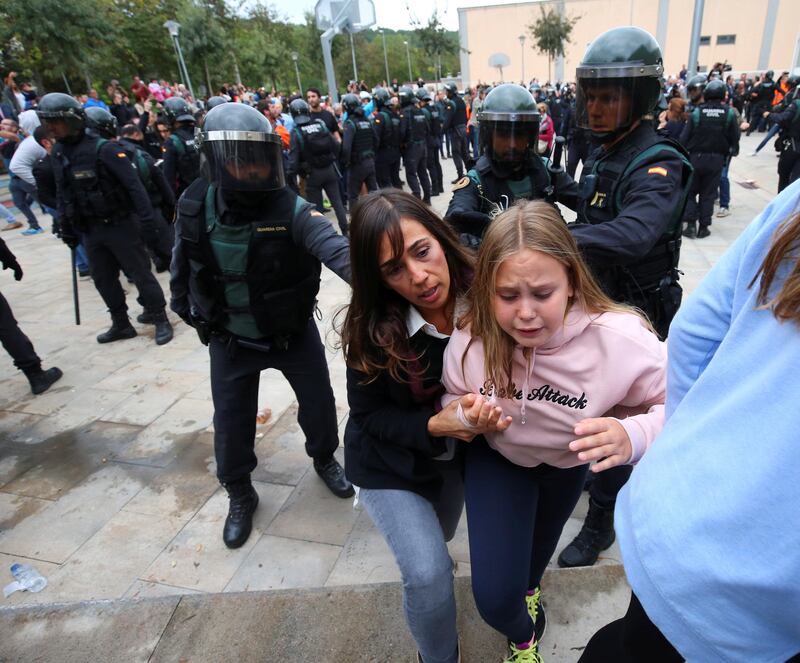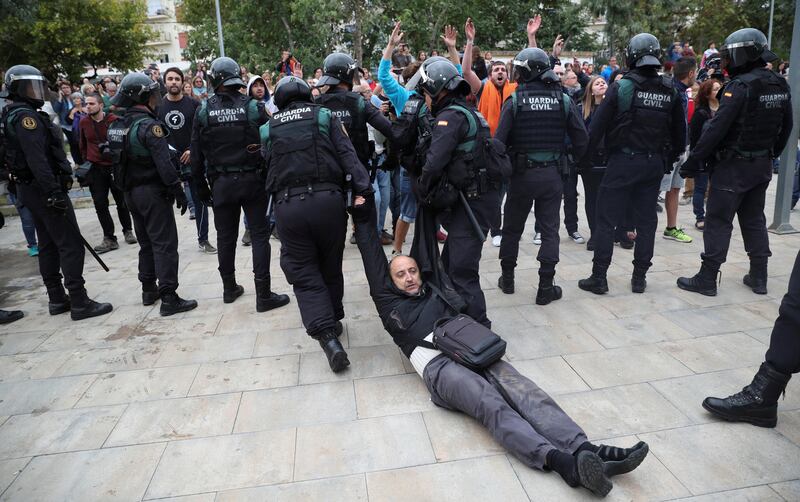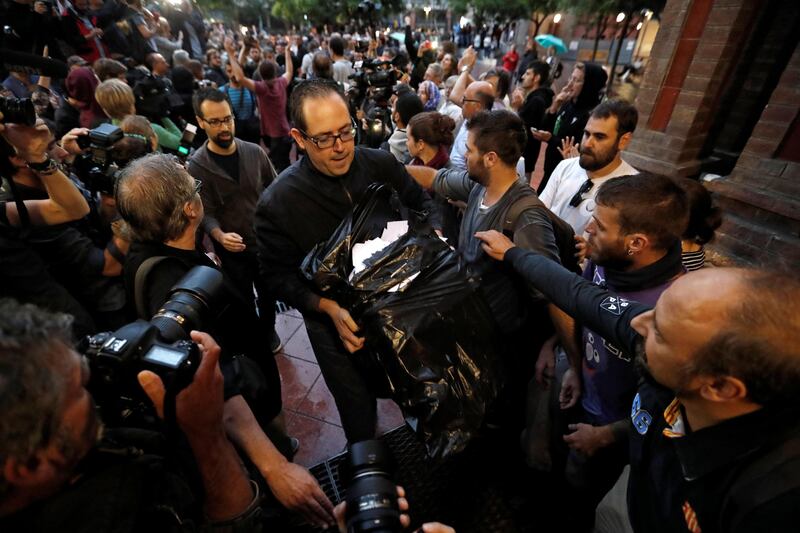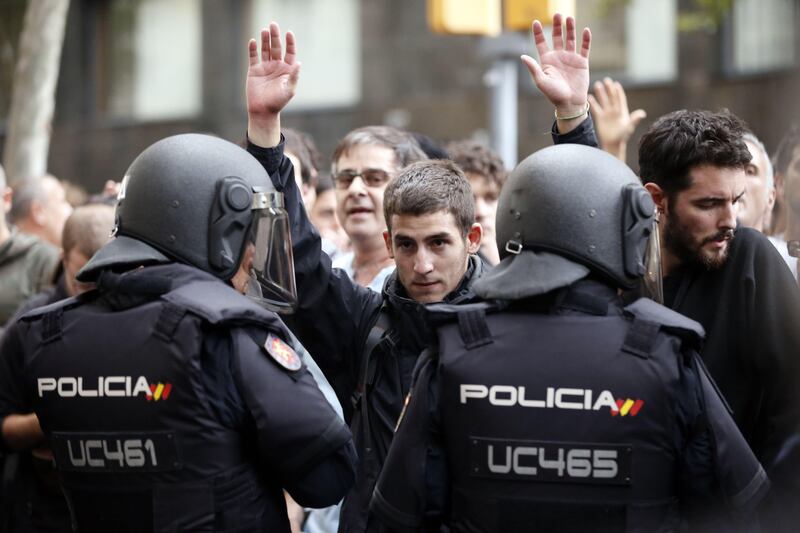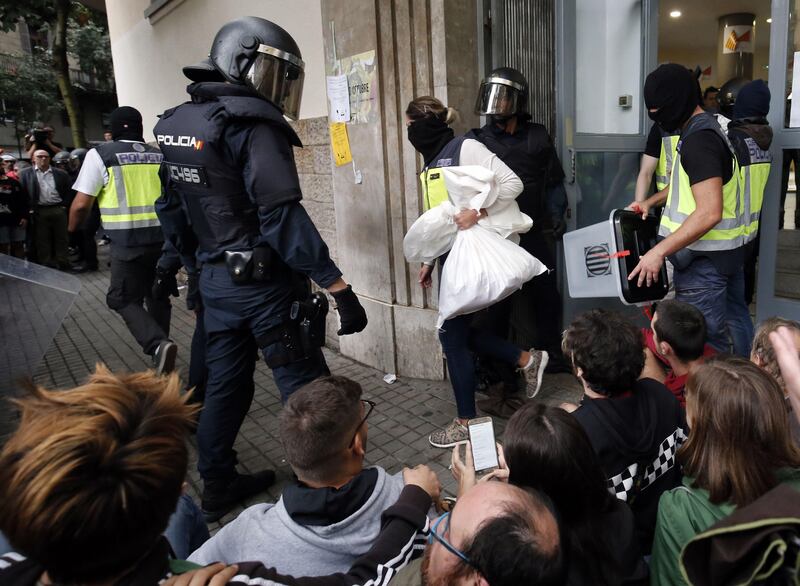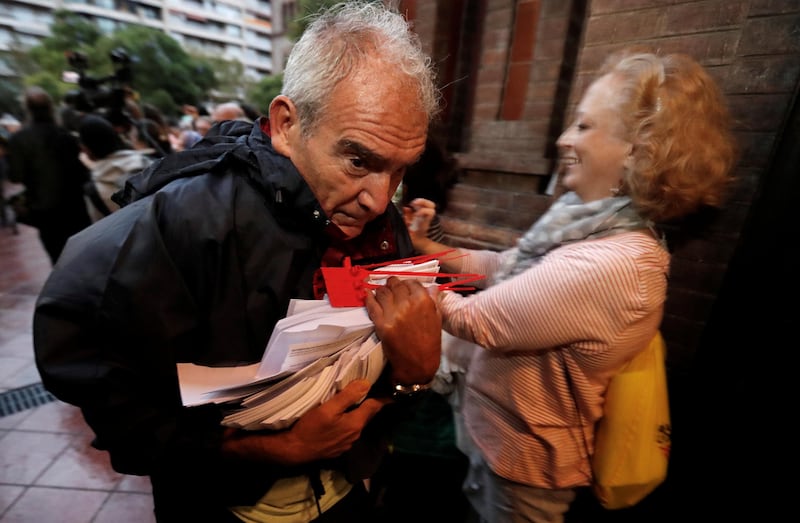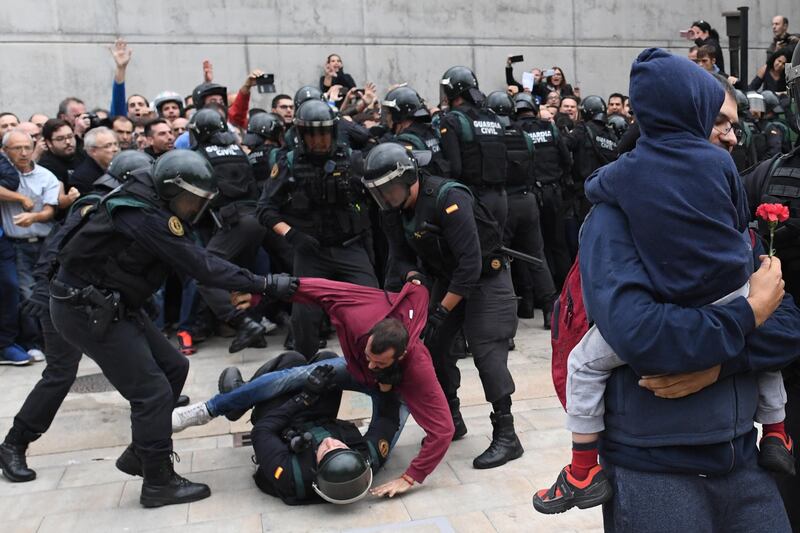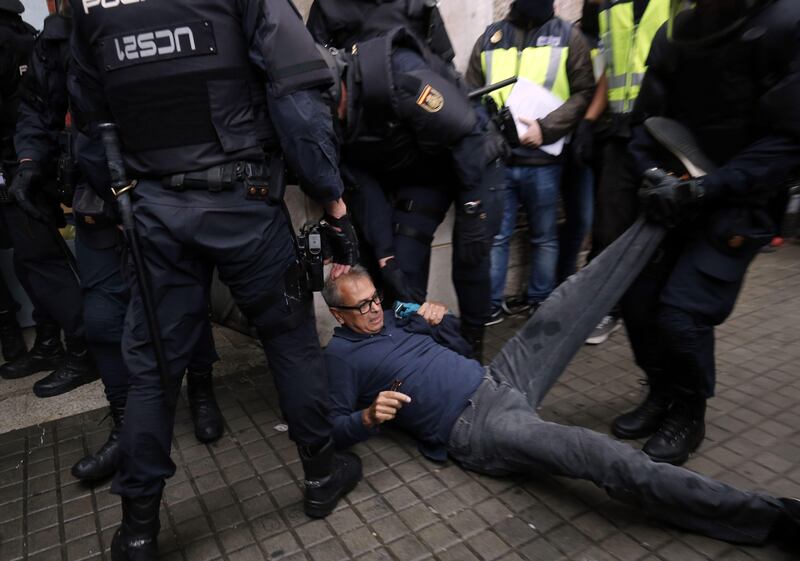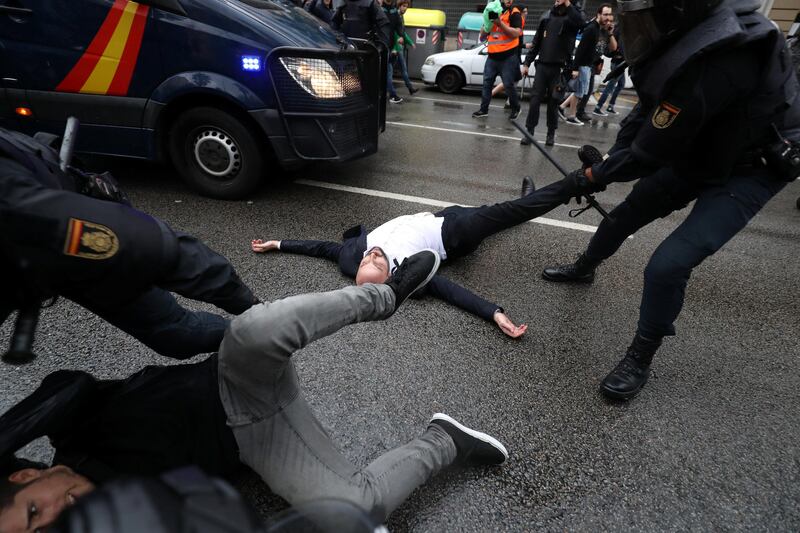At least 460 people were injured as Spanish police burst into voting stations and charged at Catalans trying to vote in an independence referendum that has plunged Spain into a constitutional crisis.
Amid pouring rain, buzzing helicopters and wailing sirens from emergency vehicles, Spanish police in body armour and with shields raided several schools where voting was taking place to stop Catalans from registering their votes. The police used batons and rubber bullets in Barcelona, while pro-secessionists threw rocks at officers in response to the crackdown.
“Police are coming to the polling stations and beating them up. We’ve seen a lot of blood,” Marta Rosique, a pro-independence spokesperson told The National.
“They are using violence in order to stop people from deciding their future. The people are actually acting in a very pacific way — as we have always done. But their answer is just violence.”
Catalan officials also criticised the police’s use of disproportionate force as early reports said 73 per cent of polling stations were open to voters. The police were acting under orders from the central government in Madrid, which says it is protecting the constitution as it prohibits secession unless approved by parliament. At least 460 people were injured in Barcelona, said the Catalan Emergency Services. There were also reports of police clashing with voters in towns outside Barcelona.
“We have initiated contacts with the EU about the violation of fundamental rights that puts the very same EU at risk,” said the Catalan foreign minister Raül Romeva.
_______________
Read more:
Spanish police storm polling station in Catalonia independence vote
_______________
The Spanish government and police have taken numerous steps to halt the referendum including arresting Catalan officials, destroying ballot papers and shutting down websites.
But Catalan voters have defied the government at every turn.
Many camped inside schools overnight after the Catalan police, the Mossos d’Esquadra, were ordered by the central government to shutter schools that were to be used as voting stations. The Catalan newspaper Ara reported that at some schools Catalans spent the night playing games to pass the time and offered coffee to Mossos officers when they arrived at 6am.
Most polling stations reported that Mossos did little to intervene in the voting process, besides warn voters that the referendum is illegal. Some videos on social media appeared to show them confronting the national Guardia Civil.
Despite reports of violence across the city, voting went smoothly at the Escola Laboure in central Barcelona during the morning. Hundreds of Catalans queued in the rain as they wanted for their turn to vote.
RT BarcaWorldwide "In Spain, this is democracy! #ShameOnSpain#CatalanReferendum pic.twitter.com/3xRW1RIvc4"
— Vanpee Jr (@MyzztahBruce) October 1, 2017
The atmosphere was calm, though less festive than in the lead-up to the vote, as rumours of undercover police and a raid circulated through the queue that snaked through the square near the Museum of Modern Art. A Catalan municipal official, meanwhile, cast a watchful eye as she monitored events at the voting station.
Spain's prime minister Mariano Rajoy has reiterated that the vote is illegal and unconstitutional, but Catalans accuse his government of undermining free speech and democracy.
“For me the first thing is visibility. It’s not a conflict but it’s an issue. We want to decide. So for me it’s important to say, ‘Hey, we are here and we want to speak up’,” Muriel Palma, a Barcelona resident, told The National at Escola Laboure.
“Independence or not; that’s not the point. At least not for me. I’m not on the street because I want to be independent. I’m here because I think we have to have the right to vote. On any issue, there should be the right to vote.”
“From a marketing perspective they are being stupid,” she added, when asked about Madrid’s response to the referendum.
I have posted multiple concerning videos of police violence from the #CatalanReferendum today.
— Gissur Simonarson 🇮🇸🏴 (@GissiSim) October 1, 2017
This one is the most shocking yet.pic.twitter.com/AjX8jKZj43
At noon in the Saint Antoni neighbourhood of Barcelona there was little indication of the unfolding crisis. Tourists milled the streets and people enjoyed late breakfast and coffee at cafes.
By nightfall, voting was continuing at schools off La Rambla, the scene of the August terrorist attack in which 13 people were killed. On the iconoic thoroughfare itself, however, it felt like any other day, with Barcelona residents and visitors alike enjoying the evening.
Local media reported that international observers from Ecuador were surprised by the police’s heavy-handed response to the referendum. "They have used force to prevent voting. We have everything recorded, we must ask for explanations and responsibilities," the Ecuadorians told Ara. Meanwhile, the Scottish National Party reported that two Scottish observers were detained by police for 45 minutes.
FC Barcelona announced on Sunday afternoon that their league match would go ahead, but behind closed doors. The Spanish league denied Barcelona’s request for the fixture to be postponed, which the Catalan team won 3-0.
“FC Barcelona condemn the events which have taken place in many parts of Catalonia today,” the club said, adding that citizens should have the right to “exercise their democratic rights to free expression”.
Underscoring the far-reaching nature of the Catalan crisis, Barca’s rivals on Sunday, Las Palmas, wore a special kit on Sunday that included the Spanish flag to show their support for national unity.
Despite the violence and Madrid’s view that the referendum is invalid, Catalans are insistent on exercising their rights.
“There’s one thing that I’m sure about; the people want to decide,” said Ms Rosique. “If the people vote and say yes, we should listen to the people. We have to state what we want. By being in the streets and mobilising in such a centralised way, we have already won.”
